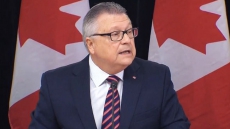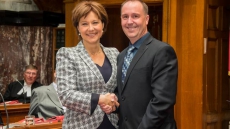MERRITT, B.C. — The mayor of a hard hit oil and gas community in British Columbia's northeast says the provincial government's rural economic development strategy fails to recognize the dire straits facing his town and other remote areas.
Bill Streeper, the mayor of the Northern Rockies Regional Municipality in Fort Nelson, said Friday stores are closing and people unable to pay their mortgages are handing him the keys to their homes and leaving town.
"We are having an economic crisis, not issues, it's a crisis," he said. "We physically need to see growth happening. Words are no longer available. It's hard to give the bank words."
Streeper said at least 70 per cent of the community's former oil and gas operations are vacant and many former workers have left town to find jobs elsewhere in Canada. He said many fathers have left Fort Nelson to find work leaving their families in homes that can't be sold because their values have plummeted.
"If you have a job in Fort Nelson right now, you better be to work early and leave late to keep your job," he said.
Fort Nelson has a population of 3,900 and is located about 1,600 kilometres north of Vancouver.
Premier Christy Clark was at the Nicola Valley Institute of Technology in Merritt on Friday to highlight the government's rural economic development strategy, which includes a $40-million high-speed Internet expansion project to build infrastructure and create jobs in rural B.C.

She said the installing Internet cables will create jobs in rural communities and improved high-speed service helps local entrepreneurs explore new business ventures without moving to urban centres.
"What is good for rural B.C. is good for all of B.C.," Clark said. "This is where the bulk of our wealth comes from and we need to make sure we are investing in people and getting to yes on projects that will allow communities like this one to thrive."
The government's 2017-18 budget includes $150 million to plant trees and create jobs in rural areas, extends to 2020 the $25 million rural dividend program to fund local projects and provides a $3,000 tax credit for search and rescue personnel and volunteer firefighters. It also starts to phase out the provincial sales tax on electricity for the resource industry and cuts the small business tax rate to two per cent from 2.5 per cent.
The government's rural strategy announcement on Friday comes just weeks before the official start of May's election, where rural-urban economic differences are expected to be major campaign issues.
Streeper said the Fort Nelson area needs the local natural gas and forest industries to start to moving again.

"I have Internet at home," he said. "It could be faster, but getting an Internet in Fort Nelson is not going to create export for liquefied natural gas."
The latest B.C. Stats employment data shows unemployment at 10.5 per cent in the northeast region, while the jobless rate in the Lower Mainland is 4.9 per cent.
B.C.'s unemployment rate leads Canada at 5.8 per cent.
Streeper said Fort Nelson council implemented widespread community cuts this week to weather the local economic downturn. The cuts included slashing budgets for annual celebrations, including Canada Day, cancelling non-essential staff training, charging residents for tax certificates, rolling back and reducing council stipends and meal allowances, and offering summer student municipal jobs to local unemployed people.




